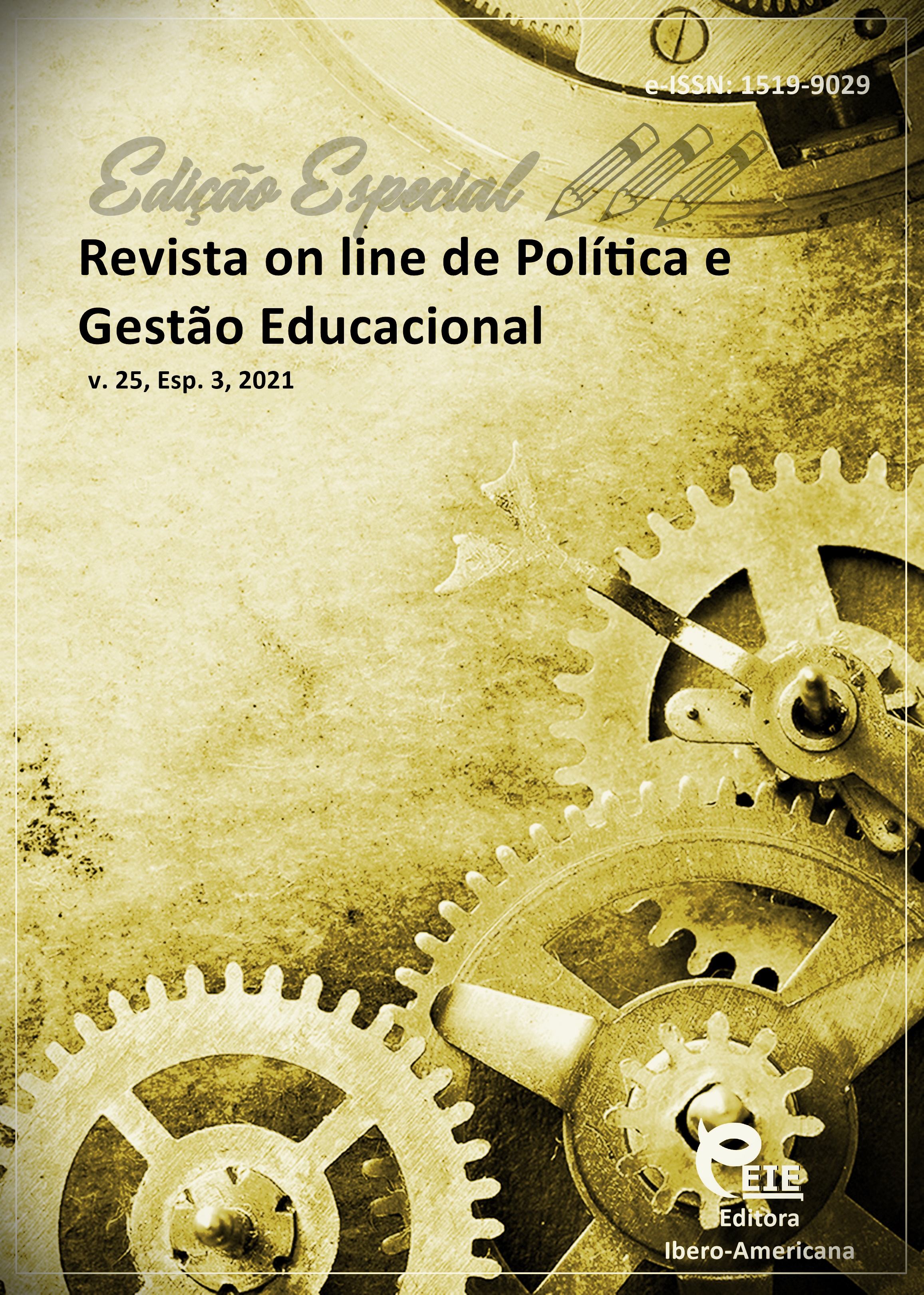Instruções para a formação de valores humanísticos nas instituições de ensino superior: problemas e perspectivas
DOI:
https://doi.org/10.22633/rpge.v25iesp.3.15581Palavras-chave:
Instituições de ensino superior, Valores humanísticos, Alunos, Principais instruções, Perspectivas em educaçãoResumo
O artigo analisa os rumos da formação de valores humanísticos nas instituições de ensino superior. Os resultados do estudo mostraram que os alunos apresentam elevada atitude em relação aos valores humanísticos, independentemente do nível de autoafirmação e autoestima. Os principais mecanismos de formação de valores humanísticos nos alunos dependem das características provocativas dos valores sociais, que ocupam um lugar dominante na hierarquia de valores e na autoconfiança profissional, refletindo as qualidades integradas do indivíduo. Verificou-se que existe uma correlação positiva entre qualidades humanísticas e qualidades pessoais e realizações acadêmicas. Existe uma ligação importante entre autoconsciência, autoestima, autoafirmação e um ideal social que reflete qualidades humanísticas nos alunos. Pode-se concluir que, para desenvolver valores humanísticos, é necessário desenvolver valores e traços de personalidade socialmente importantes. Aqui é necessário levar em consideração as necessidades cognitivas, as oportunidades de autoafirmação, bem como as conquistas de aprendizagem.
Downloads
Referências
AZERBAIJCA FOLKLORE, (2005). Baku, Qanun.
ALONI, N. Humanistic education: From theory to practice. In: W. Veugelers (Ed.), Education and humanism: Linking autonomy and humanity Rotterdam, Netherlands: Sense Publishers. 2011.
BROCETT, R.G. Humanism as an instructional paradigm. 1998. Available: http://roghie mstr a.¬com/romira1.html
DIERKSMEIER, C. What is ‘Humanistic’ About Humanistic Management?. Humanist Management Journal, 1, 9–32 2016; Available: https://¬link.spri¬nger.c¬om/art¬ic¬le/10-.1007/s41463-016-0002-6
DE GROOT, I. Why we are not democratic yet: The complexity of developing a democratic attitude. Rotterdam, Netherlands: Sense Publishers. 2011.
EFFENDI, R.; BAFADAL, I.; NYOMAN, D.; ARIFIN, I. The Construction Model of Inculcating Principal Humanistic Values in Forming a Characteristic School Environ-ment. Preprints Posted: 2, 19, 21-43, 2020. DOI: 10.20944/p¬reprints20¬2011¬.0068.v1).
JABBAROV, R. Factors affecting the development of self-realization among students of different professions. Science and Education, 9, 75-87. 10.24195/2414-4665, 2018. Available: https://s¬cience¬andeduc¬ation¬.pdpu.¬edu.ua/en¬/article¬s/2017¬-¬9-doc¬/¬20¬17¬-¬9-st12-en
MASLOW, A. Motivation and personality. Moscow, Peter. 2018.
MELE, D. Understanding Humanistic Management. Humanistic Management Journal, 1(1), 33-55. 2016. DOI: 10.1007/s41463-016-0011-5
MILLER, M. D.; GREKSON, J. A. A philosophic view for seeing the past of vocational education and envisioning the future of workforce education: Ann Arbor, MI: Prakken. 1999.
NEMIROFF, G. H. Reconstructing education: Toward a pedagogy of critical humanism. New York, NY: Bergin & Garvey. 1992.
ROKEACH, M. Beliefs, attitudes and values: a theory of organization and change. Jossey-Bass, San Francisco, California, USA. 1968.
PARI NAZ P.; MARYAM N.; EZATOLLAH N. Humanistic Education and students’ Educational Motivation in Tehran Primary Schools. International Journal of Mental Health and Addiction, 15, 312–322. 2017. Available: https://link.¬sprin¬ger.c¬om/¬art¬icle/10.1¬007/s11-469-016-9703-1
PENG C.; CARSTEN. S. Humanistic Elements in the Educational Practice at a United States Sub-Baccalaureate Technical College // International Journal for Research in Vocatio¬nal Education and Training (IJRVET), Vol. 4, Issue 2, August 2017, 117-145. DOI: 10.13152/IJRVET.4.2.2
SCHWARTZ, S. Values: individual and cultural. Pages 463-493. In: F. J. R. van de Vijver, A. Chasiotis, and S. M. Breugelmans, edit¬ors. Fund¬amental questions in cross-cultural psychology. Cambridge University Press, Cambridge, UK. 2010. Available: http://dx.doi-.org/10¬.¬1017¬/c¬bo978051¬19740¬90.019
SCOTT, P. Individualizing vocational education. VA: American Vocational Association. 1980.
SEYIDOV, S. I. Phenomenology of Creativity. Baku: Chashigoglu. 2009.
SHOSTROM, E. Man-manipulator. The inner journey from manipulation to actualization. Kiev; PSYLİB. 2003.
VEUGELERS, W. A humanist perspective on moral development and citizenship education. Rotterdam, Netherlands: Sense Publishers. 2011.
WILLIIAM T. Teaching professional and humanistic values: Suggestion for a practical and theoretical model, Patient Education and Counseling, 98, 2.162-167. 2015. DOI: //doi. org/10.1 016/j.pec 2014.10.022
WADDOCK, S. Developing Humanistic Leadership Education. Humanist Man¬age¬ment Journal, 1, 57–73, 2016. 10.1007/S41463-016-0003-5
Downloads
Publicado
Como Citar
Edição
Seção
Licença
Copyright (c) 2021 Revista on line de Política e Gestão Educacional

Este trabalho está licenciado sob uma licença Creative Commons Attribution-NonCommercial-ShareAlike 4.0 International License.
Manuscritos aceitos e publicados são de propriedade da Revista on line de Política e Gestão Educacional. É vedada a submissão integral ou parcial do manuscrito a qualquer outro periódico. A responsabilidade do conteúdo dos artigos é exclusiva dos autores. É vedada a tradução para outro idioma sem a autorização escrita do Editor ouvida a Comissão Editorial Científica.











